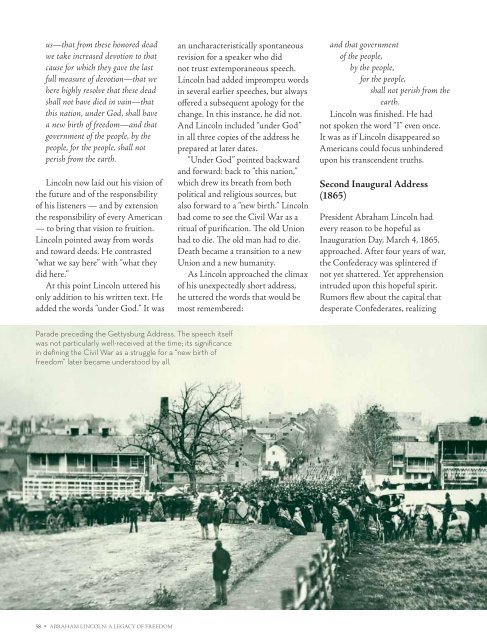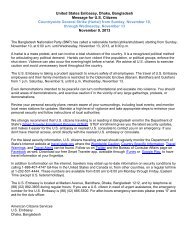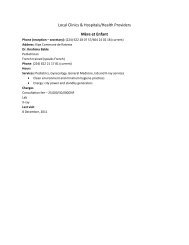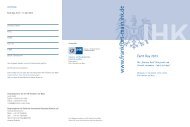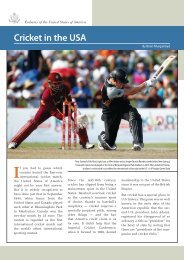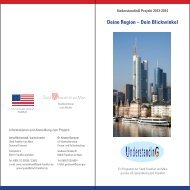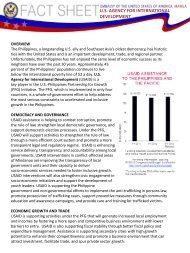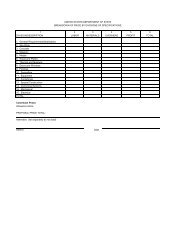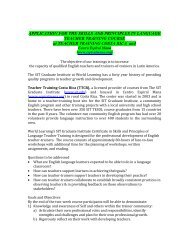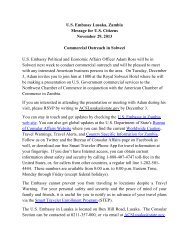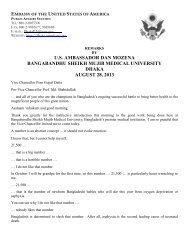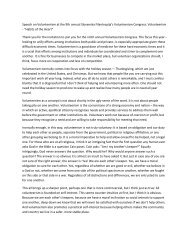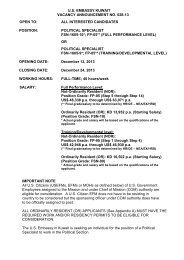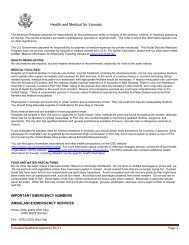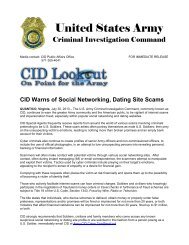Abraham Lincoln: A Legacy of Freedom - US Department of State
Abraham Lincoln: A Legacy of Freedom - US Department of State
Abraham Lincoln: A Legacy of Freedom - US Department of State
Create successful ePaper yourself
Turn your PDF publications into a flip-book with our unique Google optimized e-Paper software.
us—that from these honored dead<br />
we take increased devotion to that<br />
cause for which they gave the last<br />
full measure <strong>of</strong> devotion—that we<br />
here highly resolve that these dead<br />
shall not have died in vain—that<br />
this nation, under God, shall have<br />
a new birth <strong>of</strong> freedom—and that<br />
government <strong>of</strong> the people, by the<br />
people, for the people, shall not<br />
perish from the earth.<br />
<strong>Lincoln</strong> now laid out his vision <strong>of</strong><br />
the future and <strong>of</strong> the responsibility<br />
<strong>of</strong> his listeners — and by extension<br />
the responsibility <strong>of</strong> every American<br />
— to bring that vision to fruition.<br />
<strong>Lincoln</strong> pointed away from words<br />
and toward deeds. He contrasted<br />
“what we say here” with “what they<br />
did here.”<br />
At this point <strong>Lincoln</strong> uttered his<br />
only addition to his written text. He<br />
added the words “under God.” It was<br />
an uncharacteristically spontaneous<br />
revision for a speaker who did<br />
not trust extemporaneous speech.<br />
<strong>Lincoln</strong> had added impromptu words<br />
in several earlier speeches, but always<br />
<strong>of</strong>fered a subsequent apology for the<br />
change. In this instance, he did not.<br />
And <strong>Lincoln</strong> included “under God”<br />
in all three copies <strong>of</strong> the address he<br />
prepared at later dates.<br />
“Under God” pointed backward<br />
and forward: back to “this nation,”<br />
which drew its breath from both<br />
political and religious sources, but<br />
also forward to a “new birth.” <strong>Lincoln</strong><br />
had come to see the Civil War as a<br />
ritual <strong>of</strong> purification. The old Union<br />
had to die. The old man had to die.<br />
Death became a transition to a new<br />
Union and a new humanity.<br />
As <strong>Lincoln</strong> approached the climax<br />
<strong>of</strong> his unexpectedly short address,<br />
he uttered the words that would be<br />
most remembered:<br />
and that government<br />
<strong>of</strong> the people,<br />
by the people,<br />
for the people,<br />
shall not perish from the<br />
earth.<br />
<strong>Lincoln</strong> was finished. He had<br />
not spoken the word “I” even once.<br />
It was as if <strong>Lincoln</strong> disappeared so<br />
Americans could focus unhindered<br />
upon his transcendent truths.<br />
Second Inaugural Address<br />
(1865)<br />
President <strong>Abraham</strong> <strong>Lincoln</strong> had<br />
every reason to be hopeful as<br />
Inauguration Day, March 4, 1865,<br />
approached. After four years <strong>of</strong> war,<br />
the Confederacy was splintered if<br />
not yet shattered. Yet apprehension<br />
intruded upon this hopeful spirit.<br />
Rumors flew about the capital that<br />
desperate Confederates, realizing<br />
<br />
<br />
<br />
<br />
58 ABRAHAM LINCOLN: A LEGACY OF FREEDOM


